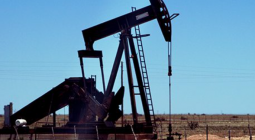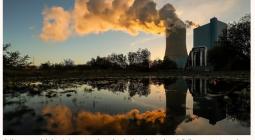US emissions roared back last year after pandemic drop, figures show
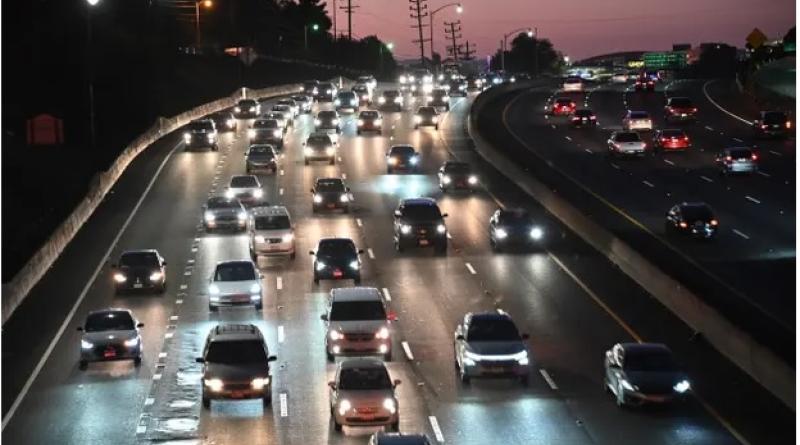
- Planet-heating emissions rose by 6.2% compared with 2020
- Rise largely down to increase in cars and trucks on the road
Planet-heating emissions roared back in the United States in 2021, dashing hopes that the pandemic would prove a watershed moment in greening American society to address the climate crisis, new figures have shown.
Following the onset of the pandemic in 2020, millions of people switched to working from home, car and airplane travel plummeted and industrial output slowed. This led to a sharp drop in greenhouse gas emissions, spurring predictions that a newly shaped American economy would emerge to help banish the era of fossil fuels.
These forecasts may well have been baseless, however, with the new research showing that US emissions rose by 6.2% last year, compared to 2020. While emissions were still 5% down from 2019 levels, the jump in pollution as people returned to previous rhythms of life was greater than last year’s overall economic growth.
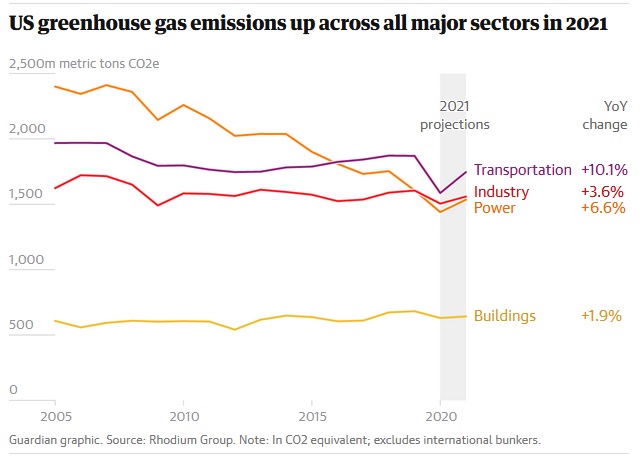
“We expected a rebound but it’s dismaying that emissions came back even faster than the overall economy,” said Kate Larsen, a partner at Rhodium Group, the independent research firm that conducted the analysis. “We aren’t just reducing the carbon intensity of the economy, we are increasing it. We are doing exactly the opposite of what we need to be doing.”
The leap in emissions in 2021 was largely down to an increase in cars and trucks on the road, with a 10% growth in transportation emissions from a year previously as Americans, and their goods, started moving again amid optimism spurred by the rollout of vaccines.
Coal, the dirtiest of fossil fuels that has been in a steady decline in the US, also made an unwelcome return, with its use in power generation posting a 17% increase on 2020. Emissions from industrial processes rose by 6.6% last year, while emissions from the use of buildings edged up slightly.
US emissions have been on a gradual decline since around 2005, primarily because of market conditions that have made coal uncompetitive and gas, a less polluting fossil fuel, attractive to utilities as a cheap and abundant alternative.
Despite more than three decades of increasingly urgent warnings from climate scientists, and a growing parade of catastrophic wildfires, floods and heatwaves, the US has never put in place any national legislation to deal with the climate crisis. Larsen said it is “critically important” for Congress to pass climate measures in the Build Back Better spending bill that has been stalled by Senator Joe Manchin, a centrist Democrat from West Virginia who has deep ties to the coal industry.
“There was hope this pandemic would bring about wholesale changes, but we aren’t seeing that across the board,” said Larsen. “More importantly, we need to decarbonize our economy and not just bet on individual behaviour changing.
“It’s concerning that we rely upon the oil and gas market to lower emissions and even more concerning we have not passed the rules and laws we need. It was always going to be an uphill battle for the US and now that hill is even steeper.”
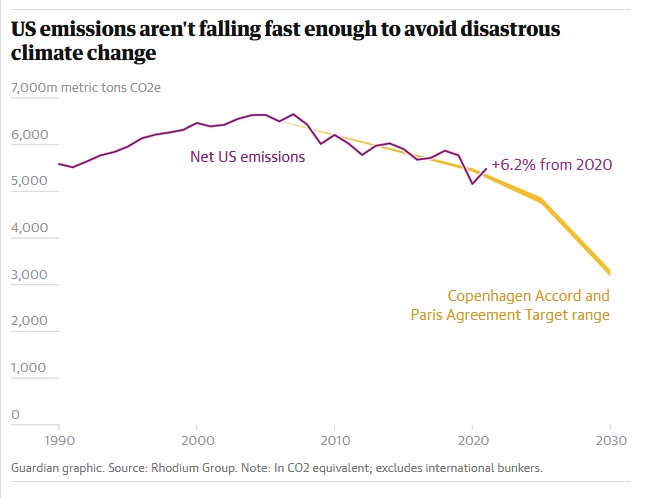
The uptick in emissions in 2021 has thrown the US off track in the rate of cuts required to meet the internationally agreed targets articulated in the Paris climate accords. The deal states that countries must try to keep the global temperature rise to 1.5C above pre-industrial levels, a point beyond which scientists warn the world will face dire impacts.
“We’ve got to come down from the peak, in fact halfway down to zero, within this decade if we are to remain on course to keep warming below a catastrophic 1.5C,” said Michael Mann, a climate scientist at Penn State University.
“There was progress at Cop26 but there needs to be much more. And for the US to be able to do its part, we need the climate provisions of Build Back Better to pass Congress as soon as possible.”
cover photo: Cars on the 101 freeway in Los Angeles. ‘It’s dismaying that emissions came back even faster than the overall economy,’ said researcher Kate Larsen. Photograph: Robyn Beck/AFP/Getty Images


